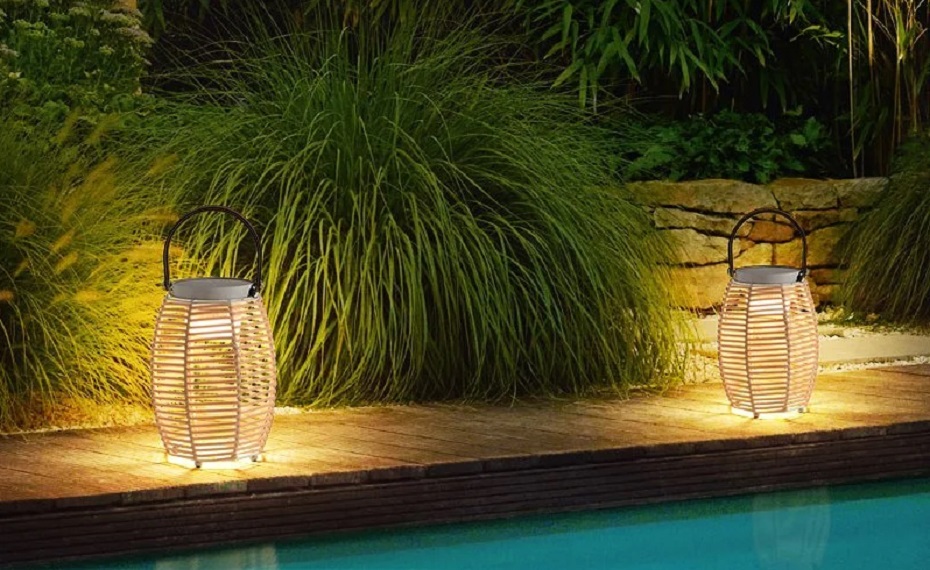Choosing the right lighting for your garden can significantly impact both its aesthetics and functionality. Two popular options are solar and electric garden lights. Each type has its own set of advantages and disadvantages. In this article, we will compare solar and electric garden lights to help you determine which is better suited for your outdoor space.
Ⅰ. First, understand their strengths and weaknesses.
1. How Solar Garden Lights Work
Solar garden lights harness energy from the sun during the day and store it in batteries. At night, the stored energy powers the lights. These lights typically consist of solar panels, rechargeable batteries, and LED bulbs, which are energy-efficient and long-lasting.
Benefits of Solar Garden Lights
1. Energy Efficiency: Solar lights do not require electricity from the grid, reducing energy consumption and lowering utility bills.
2. Eco-Friendly: By using renewable energy, solar lights have a minimal environmental impact.
3. Easy Installation: Solar lights are wireless and easy to install without the need for professional assistance.
4. Low Maintenance: With fewer components and no wiring, solar lights require minimal maintenance.
Limitations of Solar Garden Lights
1. Weather Dependent: Solar lights rely on sunlight, making them less effective in shaded areas or during cloudy weather.
2. Limited Brightness: Solar lights generally provide less illumination compared to electric lights.
3. Battery Life: The performance of solar lights can diminish over time as the batteries age.
2. How Electric Garden Lights Work
Electric garden lights are powered by the electrical grid and typically involve wiring connected to an outdoor power source. These lights can be operated through switches, timers, or smart home systems.
Benefits of Electric Garden Lights
1. Consistent Performance: Electric lights provide consistent and reliable illumination, regardless of weather conditions.
2. High Brightness: They offer brighter and more powerful lighting options, suitable for various garden lighting needs.
3. Variety of Options: Electric lights come in a wide range of styles, colors, and intensities, offering greater design flexibility.
Limitations of Electric Garden Lights
1. Higher Energy Consumption: Electric lights can increase electricity bills and are less energy-efficient compared to solar lights.
2. Complex Installation: Installing electric lights often requires professional help, especially for extensive wiring.
3. Maintenance: Electric lights may require more frequent maintenance due to potential wiring issues and bulb replacements.
If You Are in Business, You May Like
Ⅱ. Comparing Solar and Electric Garden Lights
1. Cost and Installation
Solar lights are generally more affordable and easier to install due to their wireless nature. Electric lights, while offering superior performance, often involve higher initial costs and professional installation fees.
2. Maintenance and Durability
Solar lights are low maintenance, but their performance can degrade over time due to battery wear. Electric lights require regular maintenance of wiring and bulbs but tend to have a longer lifespan if properly maintained.
3. Environmental Impact
Solar lights are eco-friendly, using renewable energy and producing no emissions. Electric lights, while more powerful, rely on grid electricity, which may come from non-renewable sources.
4. Performance and Reliability
Electric lights provide consistent and reliable performance, making them suitable for areas that need high illumination. Solar lights are best for ambient lighting and areas with ample sunlight exposure.
Ⅲ. Choosing the Right Garden Lights for Your Needs
1. Factors to Consider
Location: Assess the amount of sunlight your garden receives and identify shaded areas.
Purpose: Determine the primary use of the lights, whether for security, ambiance, or task lighting.
Budget: Consider your budget for both initial installation and ongoing energy costs.
Aesthetics: Choose lights that complement your garden's design and landscaping.
2. Recommendations Based on Use Cases
For Ambient Lighting: Solar lights are ideal for creating a pleasant and eco-friendly atmosphere.
For Task Lighting: Electric lights provide the brightness needed for tasks like cooking or reading.
For Security Lighting: Electric lights with motion sensors offer reliable and powerful illumination for security purposes.
Both solar and electric garden lights have their unique advantages and drawbacks. Solar lights are cost-effective, eco-friendly, and easy to install, making them suitable for ambient lighting. Electric lights, on the other hand, offer reliable, bright, and versatile lighting options, ideal for task and security lighting. Consider your specific needs, budget, and garden conditions to choose the best lighting solution for your outdoor space.
Recommend Reading
Post time: Jul-13-2024











